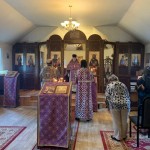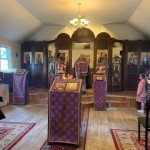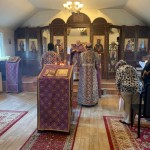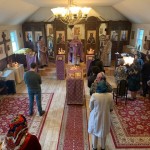On April 10, on the Fifth Sunday of Lent our parishioners gathered for the liturgical celebration in our temple. Rector of St. George Church, Archpriest Igor Tarasov served the Divine Liturgy. After the Gospel lesson he preached the following homily:
“Dear brothers and sisters in Christ! On the Fifth Sunday of Lent we hear again, for the second time, that our Lord Jesus Christ is foretelling His death and sufferings. In this way we, little by little, are being prepared for the days when we are going to commemorate the holy Passions of the Lord. These days are coming soon. Next Sunday will be the beginning of them. We will observe the feast of the Entry of the Lord into Jerusalem. And following that feast we will enter into the Passion week. The Lord says, “Behold, we are going up to Jerusalem, and the Son of God will be betrayed…” (Mk. 10, 33). We are also going up to Jerusalem, we do it in a spiritual way”.
“Today’s Gospel is also telling us about the difference between the ideals of the Christian teaching and the ideals of worldly life. The Lord rebuked His disciples, James and John who wished to be given the seats closest to the Lord in His Kingdom. He said to them, “Whoever desires to become great among you shall be yours servant. And whoever of you desires to be first shall be slave of all” (Mk. 10, 43-44)”.
“Today we also honor Venerable Mary of Egypt. She was a great sinner who became a great Saint. There is no such thing as sinless life, but there is no such sin that cannot be forgiven if the sinner repents. Mary being a harlot for 17 years (from the age of 12 to the age of 29) repented and became a greatest woman-Saint. We usually like to say that people don’t change. But here is an example of a person who totally changed her life. If you read the life story of St. Mary of Egypt you can be convinced of that. When she could not enter the church in Jerusalem because some unknown force prevented her to do so for the reason of her impurity and sinfulness, she prayed to the Most Holy Mother of God in front of Her icon outside of the temple. The Blessed Mother told Mary that she must repent and listen to Her. After she repented, received the Mysteries of Penance and Communion, Mary heard the call of the Mother of God, “Cross the Jordan, and you will find true peace”. She crossed the river of Jordan and spent the rest of her life in the desert”.
“The life of St. Mary teaches us that the true and everlasting values are quite different from those of the world. Mary of Egypt went out into the desert and had nothing. She had no friends, no home, no possessions, no clothes and almost no food. The world looked for pleasure, the satisfaction of the senses, money and power, but St. Mary had no money, no property and no power in the world. Today’s Gospel confirms the choice of St Mary, for it says that those who wish to be great must be servants. This is the opposite from all the ways of this world. But our Lord preached this and St. Mary lived by this”.
“As we said, the Church calls St. Mary “the greatest of Saints”. The use of this word “great” may surprise. In everyday life, we use “great” in other meanings. The world speaks of “great politicians” “great soldiers”, “great movie stars”, “great sportsmen”. But the Church calls St. Mary of Egypt “great” and all the centuries after she lived we ask for her prayers, but not for prayers of any politician or soldier or movie star or sportsman. Let us then think more carefully when we use this word “great””.
“Last week, reading penitential Canon of St. Andrew, we encountered the words “great merchant”. The Canon says that if someone would live a godly life, acquire the divine grace, such person will become a “great merchant”. Ven. Andrew composing the Canon took that image from the Gospel parable of a merchant seeking a precious pearl (Mt. 13, 45-46). Jesus telling that parable compared His Heavenly Kingdom to a precious pearl and a person who seeks it to a merchant. Thus, really great merchant is someone who would seek and find God’s Kingdom, a holy person. Such person like Ven. Mary of Egypt”.
“And as we approach the days of the holy Passions of Christ, the feast of the Entry of the Lord into Jerusalem, let us also think of the words of the Mother of God, which led Mary to her salvation through repentance and her greatness: “If you cross the Jordan, you will find true peace”. These mysterious words are today also addressed to each of us; the interpretation of their mystery is open to the souls of each of us, but only if we ask the Mother of God and St Mary to guide us. And then we shall find our own “entry into Jerusalem””.
“Therefore, dear brothers and sisters, let us pray to the Most Holy Mother of God and to Venerable Mother Mary of Egypt to assist us in our journey to our own Jerusalem!”
During the Litany of Fervent Supplication the Rector had a petition for the suffering country of Ukraine and its people. He also added a commemoration of the “suffering Ukrainian land” at the Great Entrance.
The choir prayerfully performed penitential hymns during preparation for Holy Communion.
Following the dismissal of the Liturgy the Rector expressed his gratitude to Tatiana Migal for bringing an old and beautiful family icon of the Annunciation to the church. That icon was placed on the holy altar and remained there for the Divine Liturgy. After the Liturgy the icon was presented to the faithful for veneration.
Then the Rector had a speech regarding some suggestion he heard from one of the parishioners asking for the usage of Russian language for homilies. Fr. Igor pointed out that some of our parishioners, especially the newly converted persons, do not understand Russian while probably all our Russian-speaking parishioners can understand English. Given such situation, it is preferred that the sermons should be proclaimed in English. However, we are open for further discussion of that issue. The Rector also made the announcements about the future celebrations of the Holy Week and Pascha and regarding the importance to receive the Holy Mysteries of Penance and Eucharist in these special days of Lent.
After the Divine Liturgy the Rector performed the Sacrament of the Anointing of the sick. All persons who desired to receive that Mystery participated in the service and were anointed with the blessed oil.




